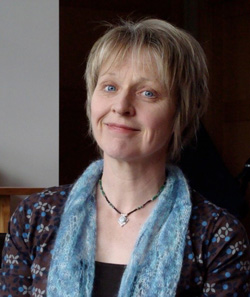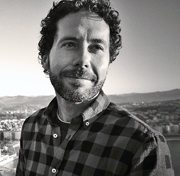The Fruit of Writing Fiction:
Trevor Corkum in Conversation
with Kathy Page

Malahat fiction contributor Trevor Corkum interviews Kathy Page, this year's fiction judge for the Open Season Awards, on personal literary influences and the future of Canada's short-story scene.
Kathy Page’s collection of stories, Paradise & Elsewhere (reviewed on our site), was nominated for the 2014 Giller Prize, and was a finalist for the Ethel Wilson Prize. She is the author of seven novels, including Alphabet (nominated for a Governor General's Award in 2005), The Story of My Face (long-listed for the 2002 Orange Prize), and The Find, a ReLit finalist in 2010.
Click here for details on sending in a contest submission (deadline November 1).
The short story form is chameleon and shape shifting, filled with infinite possibility. The best short fiction, I think, comes into being seemingly fully formed, completely original, sui generis. Who are the short story writers you admire most? What short fiction writers have had the biggest impact on your own work in this form?
Yes—one of the wonderful things about the short story is the scope it offers for formal invention, how infinitely various and startlingly new (and at the same time ancient) it can be. Of course, the novel is a shape-shifter too, but brevity makes innovation and radical experiment more feasible, and it certainly makes it possible (though not required) to play around with the way plot is put to work. The short story, in its intensity and in the ways it is structured and read, is as much related to poetry as it is to the novel.
Oddly enough, many of the short fiction writers who have meant most to me have names beginning with C: Carter (Angela), Carver, Calvino, and Chekhov... These are writers who do very different—indeed, almost opposite—things with both the story and the sentence. Carter, for example, plays with folk and fairy-tale motifs but writes in an intricate, baroque fashion, whereas Carver is distinguished by the pared-down style he and his editor arrived at, and by the sheer ordinariness of his characters. Calvino is playful enough to tell a story from the point of view of a mollusc. Chekhov's characters are so convincing that he can get away with anything: think of the ending of "Gusev," where the protagonist dies and the perspective shifts to a shoal of fish, a shark, and finally the ocean itself. British writer David Constantine, just beginning to be read this side of the pond, is another C, and then of course there is Joyce Carol Oates, and (moving on to other letters), Kafka, J.G. Ballard and Olivia Butler. Since moving here I've encountered wonderful Canadian short fiction writers—to name just a few, Caroline Adderson, Alice Munro, both of the MacLeods…
As for your "fully formed" hypothesis, this is probably a very personal thing. For me, some stories arrive almost complete and others are a struggle to excavate (it's often a matter of stripping out extraneous parts), but I don't think you'd be able to judge which is which from reading them.
You've had a varied career—teacher, carpenter, therapist, lecturer, just to name a few. You've also lived and worked in several countries—the U.K., Finland, Estonia, and now Canada. How do the various threads and themes of our lives make their way into fiction? How should we, as writers, treat this real-life source material? Why fiction and not memoir, for example?
I don't think there is a "should" here. What you do with your material and how much you use your own life experience or observations of others depends on whether your interest is in the story and where it can go, or in coming as close as you can to the experience, or the facts, and the meaning they have for you. Intention is important, but I'd argue that even when we try very hard not to, most of us write some degree of fiction. Amy Hempel's story "The Harvest" pretty much sums the situation up, I feel. I'm by nature a fabricator. I sometimes write memoir, or stay close to my own experience in fiction, but I tend to feel uncomfortable doing it. I want to shape things, edit and exaggerate, and I feel restricted if I don't, and sometimes guilty when I do. It's better to feel free.
If you could spend a full day with one of your literary heroes, who would you invite, and what would you do?
Perhaps I'd go for a hike with Edward Thomas, an English First World War poet with "Eco" leanings. He figures in my forthcoming set of linked stories. My caveat is that we'd go in the landscape of his time and place, not mine. Thomas wrote a few short stories, though his poetry is on the whole more interesting than they are. He's a fascinating character. Often depressed and conflicted at home, he was at his best outdoors, walking or cycling, and was supposedly a great wayfaring companion. Like most heroes, he might be a disappointment, but the landscape would not.
In your own career, you had early success, and then stepped away from writing for a time, disillusioned by the publishing world in the 1990s. Eventually, you found your way back, and have enjoyed great success and recognition, winning or being shortlisted for major literary awards. Dire prognostications of the future of books have been sounding in the literary world for some time—publishers going under, bookstores closing, reading numbers seeming to decline in the age of the virtual world. Given this backdrop, why continue to write?
I did step away from writing novels, or I tried to. I flirted briefly with writing for film and TV, and looked into a career in social housing management… However, I continued to write short fiction, and in many ways those years were very productive since the screenwriting side of things taught me a great deal about structure, and I made real progress with my stories. A big part of my problem then was that I was with a big publisher who was then bought by a bigger one. I didn't really satisfy them in terms of sales. The industry was becoming much more focused on the idea of each title being very profitable, rather than the business simply making a profit over all, as in the old days. So I had a feeling of being a disappointment to them: Could I not just do something differently, though they did not know exactly what, and would I please never write a short story again? I felt bad about it. Now, none of this seems so problematic. Short fiction may not be viable in the new hyper-commercial atmosphere, but nonetheless, I and others (including a few very wonderful publishers) love it, think it's of huge value and know that it connects powerfully with readers: so yes, this is very much worth doing. The readership may be smaller than it is for best-selling novels or blockbuster movies, but that does not mean its cultural value is lesser. We're so used to the Hollywood model that we irrationally assume everything should be measured and valued that way.
With a novel, the reader steps into a vast and fully imagined world and may stay there for hours or days on end, pulled along by the emerging storyline, character development and so on. I think this is what many of us want a lot of the time, and it can be a wonderful thing. Short stories ask something different of the reader—a particular, concentrated kind of attention and the ability to sense and absorb the story as a whole. Reading a good story is both intense and very satisfying, but it is not the same as being "carried along." It's more like a dive into the lake.
Of course, in the current market, short fiction is unlikely to pay the writer a living wage for the time put into crafting it, and yes, there are many competing forms of entertainment. Even so, I think that the important thing is to make good work and get it out, to build and sustain a short fiction culture, which is exactly what we're doing here, with this contest.
In a follow-up question, what do you think is the state of short fiction in Canada today? Are you optimistic about the short story's future?
Yes. I see many wonderful shorty writers and a great deal of respect for the short story in Canada. There's a tradition of story writing, and some pride about that tradition. Canada's wealth of independent presses, and journals like this one, are a huge force for the good, ensuring that a huge variety of short fiction can appear. There's a sense of the Canadian short story moving beyond its traditional confines, especially in terms of subject matter. So all in all, I think the ecosystem is very healthy.
You've written successfully in both short fiction and in the novel. How and why does a project find a particular form for you?
My novels often arise out of a combination of a character or characters who won't go away, a predicament of some kind, and a big question that needs to be explored and elaborated (rather than answered). The beginning of a novel is rather like making a snowball: more and more seems to stick to what I already have; the thing accumulates, grows, and eventually begins to move, still growing as it rolls along. In a novel, I'll often be interested in the fruits of a particular action over time. My short stories tend to foreground shorter periods of time, and even when they are full of event they are more likely to focus on the architecture, quality and meaning of a particular experience. I always know when I am beginning something whether it is a story or a novel. Once, I did return to a published short story and use the main characters and events again in a novel. In that novel (Frankie Styne and the Silver Man, which comes out in Canada this fall), the material from the story is not much changed, but there are many other characters and a much longer timeline which stretches either side of the original idea.
Finally, what are you looking for in this year's contest? Any tips for the short story writers who will be entering their work?
I want to be surprised, moved, or made to think, and perhaps all three—to read vivid, original stories that have a powerful effect of some kind, whether that is achieved by subtle or spectacular means. One tip: Leave as long as possible between revisions.

Trevor Corkum
* * * * * * * *









